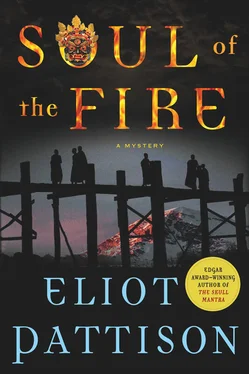Eliot Pattison - Soul of the Fire
Здесь есть возможность читать онлайн «Eliot Pattison - Soul of the Fire» весь текст электронной книги совершенно бесплатно (целиком полную версию без сокращений). В некоторых случаях можно слушать аудио, скачать через торрент в формате fb2 и присутствует краткое содержание. Год выпуска: 0101, ISBN: 0101, Издательство: St. Martin, Жанр: Полицейский детектив, на английском языке. Описание произведения, (предисловие) а так же отзывы посетителей доступны на портале библиотеки ЛибКат.
- Название:Soul of the Fire
- Автор:
- Издательство:St. Martin
- Жанр:
- Год:0101
- ISBN:9781250036476
- Рейтинг книги:4 / 5. Голосов: 1
-
Избранное:Добавить в избранное
- Отзывы:
-
Ваша оценка:
- 80
- 1
- 2
- 3
- 4
- 5
Soul of the Fire: краткое содержание, описание и аннотация
Предлагаем к чтению аннотацию, описание, краткое содержание или предисловие (зависит от того, что написал сам автор книги «Soul of the Fire»). Если вы не нашли необходимую информацию о книге — напишите в комментариях, мы постараемся отыскать её.
Soul of the Fire — читать онлайн бесплатно полную книгу (весь текст) целиком
Ниже представлен текст книги, разбитый по страницам. Система сохранения места последней прочитанной страницы, позволяет с удобством читать онлайн бесплатно книгу «Soul of the Fire», без необходимости каждый раз заново искать на чём Вы остановились. Поставьте закладку, и сможете в любой момент перейти на страницу, на которой закончили чтение.
Интервал:
Закладка:
Judson looked down at his lunch. “Never thought about it.”
Shan did not miss the flicker of hesitation on Judson’s face. The American had indeed thought about it. “Politically acceptable. And why has our government put such great faith in Hannah Oglesby?”
Shan did not understand the sudden hardness in the American’s expression. Judson stared out into the darkness before answering. “Her parents were members of the American Communist Party when they were young. Jailed for protesting the war and the poisons of capitalism. She never would have made it in the U.S. Foreign Service, but folks in the UN love her. Anti-American Americans are all the vogue. In Beijing’s history books, her parents fall under the heading of international cadres enlisted in the struggle against imperialists.”
“The two of you seem close.”
Judson shrugged. “The only two Americans in Zhongje. I brought some movies on discs, but we finished those in the first two weeks. So the new pastime is talking about home and taking morning nature walks.”
Shan laid his chopsticks on his plate, finished with his meal. “You know they mean to use the Commission to whitewash the immolations. Deputy Secretary Pao means to give Beijing reason to treat immolations in the future as crimes or acts of terrorism. That way Public Security can just shoot anyone they find on fire. You would put your name to such a report?”
Judson pushed the question back. “The government would assume a former prisoner would always sign whatever it put before him. No one gets out of prison here without being broken.”
“Commissioner Xie was a former convict. Madam Choi and Vogel both fled Beijing just ahead of corruption scandals. They are holding my closest friend in prison. I assume being broken or beholden to Emperor Pao was the most important job qualification for this Commission. What leverage do they have over you?”
Judson looked like he had bitten something sour. He gave one of his lightless grins. “In the mornings, Hannah and I like to go on walks, watching the wildlife. Tibet offers so many fascinating specimens. There are weasels and vultures and little birds that only live to sing.”
“I’m sorry?”
“Comrade, I know China well enough to know I don’t know you,” the American replied, then stood and lifted his tray.
Shan spoke to his back. “You won’t see the jewel of my faith. Just the gems that are my gleaming bones.”
The American slowly turned. “It’s one of those death poems, isn’t it?” he asked.
“If Zhu says there were nineteen, there’s probably a lot more.”
The hardness left the tall American’s face, and he reached into his pocket to produce a folded page. “This was left under my door.” It was a photocopy of another verse. “I can’t read Tibetan, only speak it. But it looks like the original was charred around the edges.”
Shan translated. “‘A cold night fifty years long,’ it says. ‘Forgotten in one warm prayer.’”
CHAPTER THREE
The infirmary for Zhongje, made for Chinese government workers, was the most modern medical facility Shan had seen in Tibet. White tile floors and stainless steel equipment gleamed under banks of fluorescent lights. Chinese nurses and Tibetan orderlies in neatly pressed uniforms formed two lines flanking the double glass doors as the members of the Commission were escorted inside. A stern, middle-aged Chinese woman who wore her hair tightly pinned at the nape of her neck introduced herself as Dr. Lam, chief medical officer. Clutching a clipboard to her chest, the weary-looking physician led them past a ward with several patients to the glass observation wall beside an intensive care chamber. The limbs of the patient inside were swathed in bandages, one arm punctured by an intravenous tube. Along the left side of his head, the skin and hair had been burned away, though his Tibetan features were still obvious. The skin elsewhere on his head was red and peeling.
“Kai Cho Fang,” the doctor read from her clipboard. “Third-degree burns over sixty percent of his body. Apart from the damage to his lungs, no vital organs affected.” She looked up but kept speaking as if in recitation. “Thanks to the prompt response of our trauma team, he will survive. His family expresses their shame for his irresponsible act, and their gratitude to the people’s government for providing compassionate care.”
Judson asked the question that leapt to Shan’s tongue. “May we speak with him?”
The doctor stiffened. “Due to the risk of infection, the patient is permitted no visitors for at least two weeks.”
Shan inched toward the back of the group and scanned a second clipboard that hung outside the door, then ventured down the corridor, noting the suite of offices where the patient rooms ended. A Tibetan woman in a lab jacket stepped out of an alcove, holding a file, and hastily moved away, as if to avoid him. He was about to quicken his pace to follow when he saw Sung staring at him. The major gestured him back with a casual roll of his hand, the way he might summon a straying dog. As Shan rejoined the group, the doctor darted past him into Kai’s chamber, scolding a nurse who was holding a syringe uncertainly over the patient’s ravaged arm. The doctor took the syringe and emptied it into a port in the intravenous tube. As she did so she snapped at an orderly, who pulled drapes across the observation window. Choi herded them back to the elevator.
The Commission spent the remainder of the day reviewing the files of four more monks and two Tibetan women who had immolated themselves, following what Shan now realized was its steadfast pattern. Choi or Vogel would read a brief official statement aloud, always concluding with a forensic report from Public Security. Miss Zhu then offered praise for the hardworking investigators who were able to distill the truth under difficult, often gruesome, circumstances. The Commissioners would ask questions about the location of each incident, with Vogel always inquiring about the family of the subject, triggering a presentation by Zhu or Choi of a background report that provided no details, only statements that the family had been from the reviled landlord class or, worse, the ranks of religious reactionaries. Madam Choi would then drop the file onto her stacks for psychotics or terrorists.
By the end of the day Shan felt strangely weak, sapped not by the drudgery but the torment of becoming part of Emperor Pao’s machine. As the sun was setting, he found Judson sitting alone in the cafeteria and joined him with his bowl of rice and vegetables.
“Consider me a pika,” he said to the American.
“Sorry?”
“I’m not a weasel or a vulture. And if I sang, I would not have survived five years in the most notorious death camp in China. There are birds enough on the Commission staff. A pika is a meek creature that hides in the rocks. They sometimes come out to watch the strange antics of humans. They collect shiny objects, like prayer beads. Tibetans say they don’t hibernate, they just meditate underground all winter.” He took a bite of his dinner, returning the American’s gaze. “Miss Lin provides support for all the Commissioners, but she seems very focused on you and Miss Oglesby.”
Judson nodded his agreement. “Runs errands. Makes arrangements. Tends to the tea. Always wears her clothes too tight, so nothing is hidden. She flirted with me for a whole week before giving up.”
“It is likely she works for Public Security.”
“One of the birds. She wasn’t trying to bed me because of my rugged good looks. I smile every time I give her my dirty laundry.”
“Ask her for a favor.”
Judson’s brow wrinkled in curiosity.
Shan pushed a slip of paper across the table. “This is the birthdate and registration number listed on the clipboard outside Kai’s room. It’s easy to change a name, but altering his vitals is more troublesome, not worth doing for a quick visit by unsuspecting foreigners.”
Читать дальшеИнтервал:
Закладка:
Похожие книги на «Soul of the Fire»
Представляем Вашему вниманию похожие книги на «Soul of the Fire» списком для выбора. Мы отобрали схожую по названию и смыслу литературу в надежде предоставить читателям больше вариантов отыскать новые, интересные, ещё непрочитанные произведения.
Обсуждение, отзывы о книге «Soul of the Fire» и просто собственные мнения читателей. Оставьте ваши комментарии, напишите, что Вы думаете о произведении, его смысле или главных героях. Укажите что конкретно понравилось, а что нет, и почему Вы так считаете.












